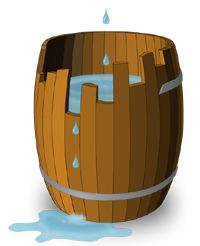| At left: Poorly pollinated blackberry. The ovules in the center were not fertilized by a pollen grain, so they did not develop drupelets. The most likely cause was insufficient bee visits. To enlarge and compare with a well pollinated berry click on the image |
Pollination
Beekeepers
(Apicultores que alquilan las colmenas de la abeja para la polinización)

Reconstruction underway
I. Welcome to Pollinator 2.0Justus von Liebig, a German chemist of the 1800s proposed a significant principle of nature. It's called Liebig's Law of the Minimum, or sometimes the Law of the Limiting Factor.Liebig used a barrel as an illustration. The barrel can only be filled to the level of the shortest stave. Likewise in many areas of the natural world, one factor can limit the whole. For example, there are eight amino acids that our bodies cannot produce. These must be present in our food, or we will suffer nutritional deficiency diseases. However, they must be present in a proper balance. If one is missing, the others cannot be utilized. Corn is a major food of Native Americans. However, if too much corn is eaten, one will suffer deficiency, because it lacks one of the eight essential amino acids - lysine. If lysine is added, the remainder of the nutrients can be used. Whether they knew the reason or not, they invented a dish that solved the problem. They added beans to the diet, creating "succotash," Beans supplied the missing amino acid and made a balanced diet. Farmers know that one deficient mineral can cause a serious crop failure, because the plant cannot properly utilize the other minerals which are present. They rely on soil tests to identify any limiting factors so they can be corrected. Pollination can be a limiting factor in horticulture. Every other necessary cultural need may be met, but pollination failure can limit the quality, the quantity, or even deny the yield altogether. |
Liebig's Barrel |
Pollinator decline, and the need to manage pollination are the reason The Pollination Home Page and its predecessors, Palmetto Pollinator and The Pollination Scene, were begun more than two decades ago.
Now it is recognized as more than an agricultural issue, and it is time for an upgrade. So welcome to Pollinator 2.0.
The old page has been taken down and is being rebuilt, piece by piece with more information, updated and additional links, better graphics, new videos and a whole lot more. This is the happening place for anything to do with pollination, and it will also include some side trips.
Welcome!
Dave, AKA Pollinator, or sometimes The Old Drone
(Drones don't normally get old, unless they fail to fulfil their function in life.)
All about pollination (Under Reconstruction)
- Environment: pollinator education, pollinator decline, pollinator protection
- The world of bees (except honey bees)
- Honey bees and their management
- Non-bee pollinators: bats, butterflies, birds
- Pollination management
- Plant-pollinator database
- Pollination services
- Books, links and other resources
- Opportunities: Education, Events, Jobs

